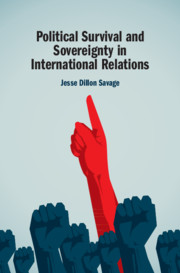Book contents
- Political Survival and Sovereignty in International Relations
- Political Survival and Sovereignty in International Relations
- Copyright page
- Dedication
- Contents
- Figures
- Tables
- Acknowledgments
- Introduction
- 1 Political Survival and the Surrender of Sovereignty
- 2 Submission, Resistance, and War
- 3 Subnational Politics and Sovereignty in Post-Soviet Georgia
- 4 Mass Politics and the Surrender of Sovereignty
- 5 European Informal Empire in China, the Ottoman Empire, and Egypt
- 6 Cross-National Variation in Sovereignty and Hierarchy
- 7 Hierarchy, Political Order, and Great Power Politics
- Book part
- Bibliography
- Index
1 - Political Survival and the Surrender of Sovereignty
Published online by Cambridge University Press: 09 March 2020
- Political Survival and Sovereignty in International Relations
- Political Survival and Sovereignty in International Relations
- Copyright page
- Dedication
- Contents
- Figures
- Tables
- Acknowledgments
- Introduction
- 1 Political Survival and the Surrender of Sovereignty
- 2 Submission, Resistance, and War
- 3 Subnational Politics and Sovereignty in Post-Soviet Georgia
- 4 Mass Politics and the Surrender of Sovereignty
- 5 European Informal Empire in China, the Ottoman Empire, and Egypt
- 6 Cross-National Variation in Sovereignty and Hierarchy
- 7 Hierarchy, Political Order, and Great Power Politics
- Book part
- Bibliography
- Index
Summary
This chapter serves two purposes. The first purpose is to provide a theoretical explanation for why subordinate actors will surrender sovereignty to an external power and when they might choose to resist. The chapter lays out how high levels of rent-seeking and high levels of political contestation can create incentives for actors to give up sovereignty. I also show that actors’ choices are going to depend on their beliefs about the costs of formal, territorial expansion for the dominant state. If actors in subordinate states believe that territorial expansion is cheap, then they may support informal forms of hierarchy knowing that the dominant state can impose a more costly form of formal hierarchy even if they resist. The second purpose of the chapter is to show that dominant states prefer informal forms of hierarchy to formal forms of hierarchy such as colonialism or military occupation. This is done by building a theoretical argument regarding the higher costs associated with formal control. This theoretical argument is supplemented by a brief historical survey demonstrating that European powers almost always preferred informal arrangements to territorial expansion, even during periods when there were few constraints on territorial expansion and colonialism.
- Type
- Chapter
- Information
- Publisher: Cambridge University PressPrint publication year: 2020



